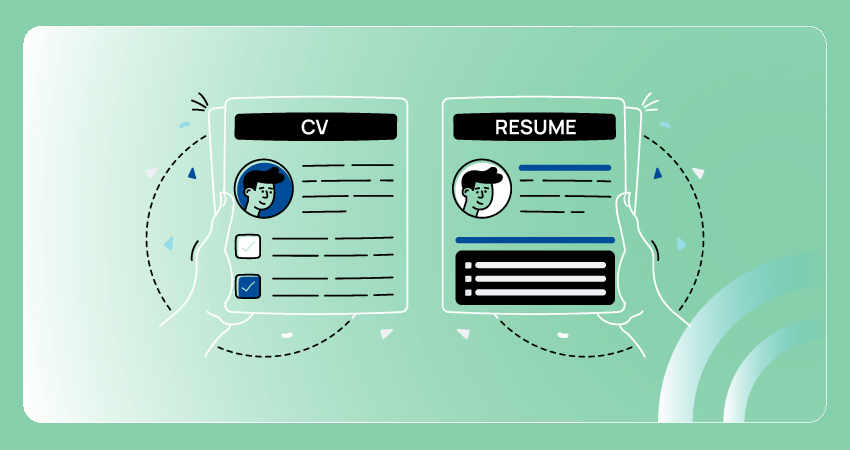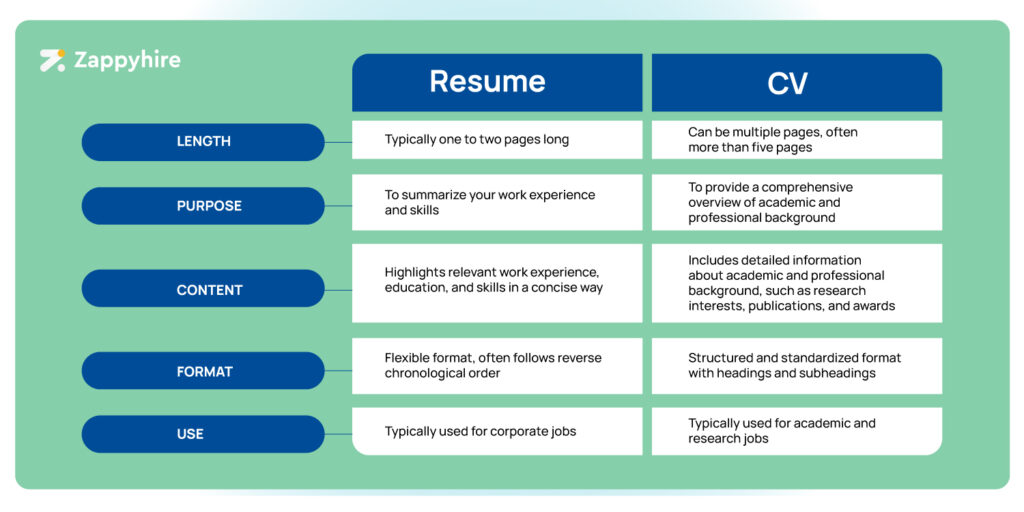
When it comes to job hunting, two terms that are often used interchangeably are “CV” and “resume.” While they may seem to refer to the same document, there are significant differences between the two. Firstly, let’s define what a CV and resume are.
What is a CV?
A CV (Curriculum Vitae) is a detailed document that includes your academic and professional background, publications, research, teaching experience, awards, and other accomplishments. It is a comprehensive summary of your career, usually several pages long, and can be more than five pages.
What is a resume?
A resume, on the other hand, is a brief document that highlights your relevant work experience, education, and skills. It is typically one or two pages long. Resumes are typically formatted in reverse chronological order, with your most recent work experience listed first. They should be concise and easy to read and should highlight your most relevant skills and experience for the job you’re applying for.
What is the difference between a resume and a CV?

Length
As mentioned above, a CV can be much longer than a resume because it includes more detailed information about your academic and professional history. A resume, on the other hand, should be concise and highlight only the most important and relevant information about your qualifications.
Industry
A CV is commonly used in academic, scientific, and medical fields when applying for research positions or faculty positions at universities. If you are applying for a job in a more corporate setting, use a resume.
Purpose
The aim of a CV is to provide a comprehensive picture of your academic journey and contributions, whereas the content of a resume is streamlined and focuses on relevant experiences and achievements that directly relate to the job you are applying for.
Content
When it comes to content, a CV tends to include more detailed sections than a resume. These sections may encompass your educational background, research interests, academic honors and awards, teaching experience, publications, conference presentations, grants and scholarships, and professional affiliations.
In contrast, a resume typically consists of concise sections such as a professional summary or objective, work experience, skills, education, and certifications.
Format and Structure
A CV tends to follow a more structured and standardized format, including headings and subheadings to clearly organize the information. It can be multiple pages long, depending on your experiences and accomplishments.
Conversely, a resume is usually limited to one or two pages and often follows a reverse chronological order, starting with the most recent experience. The format of a resume is more flexible, allowing for customization and highlighting key information using bullet points and concise statements.
Did you know?
The use of keywords in resumes and CVs has become increasingly important in the digital age. Many employers and recruiters use Applicant Tracking Systems (ATS) to scan resumes for specific keywords related to job requirements before they are even reviewed by a human.
So, which one should you use, a CV or a resume?
It depends on the job you are applying for. If you are applying for a job in academia or research, a CV is typically the preferred format. This is because these fields value a detailed overview of your education and research experience.
If you are applying for a job in a more corporate setting, a resume is typically the preferred format. This is because these fields value a concise and easy-to-read document that highlights your skills and experience.
Is it ok to use a resume as a CV?
While there may be some overlap in the information included in both documents, it is generally not recommended to use a resume as a CV or vice versa.
Using a resume as a CV or vice versa can lead to a mismatch between the document and the employer’s expectations. For instance, if you submit a resume when a CV is requested, it may give the impression that you haven’t provided a thorough account of your academic and professional background. Similarly, if you submit a CV when a resume is expected, it might overwhelm employers with excessive details that may not be relevant to the specific job.
To ensure that you present yourself in the best light to potential employers, it is crucial to use the appropriate document for each situation. If you’re unsure whether to use a resume or a CV, carefully review the job description or consult with industry professionals or career advisors to determine which format would be most suitable.
Do employers prefer a CV or a Resume?
The preference for CVs or resumes can vary depending on factors such as the industry, country, and specific job requirements. While there is no definitive answer, understanding the general tendencies can provide guidance when deciding which format to use.
In the United States and Canada, employers typically prefer resumes for most job applications. Resumes are concise, tailored to specific positions, and highlight relevant work experience and skills. They allow employers to quickly assess an applicant’s qualifications and determine their fit for a particular role. Resumes also align with the fast-paced nature of many industries, where recruiters often have limited time to review applications.
On the other hand, CVs are more commonly favored in academic, scientific, and medical fields. These industries value comprehensive information about an individual’s academic achievements, research experience, and publications. Employers in these sectors often expect CVs to assess an applicant’s suitability for research positions, faculty roles, or scholarly pursuits.
Outside of North America, the preference for CVs or resumes can vary by country. For example, in Europe, Asia, and Africa, CVs are more commonly used as the standard application document across different industries. However, it is essential to research the norms and expectations of the specific country and industry you are targeting.
To increase your chances of success, it is crucial to adapt to the expectations of your target employers. Carefully review the job descriptions, research industry practices, and, if possible, seek advice from professionals in your desired field. When in doubt, you can always check the job description or contact the employer to ask what they prefer. By tailoring your application to the preferred format, you demonstrate your attention to detail and willingness to meet employer expectations.
Keep them updated
Remember that both CVs and resumes are important documents that showcase your skills and achievements to potential employers. Therefore, you should always make sure that they are accurate, clear, well-organized, and error-free. You should also update them regularly and proofread them before sending them.
Ultimately, while employers may have preferences for CVs or resumes, the most important aspect is presenting your qualifications and experiences in a clear, concise, and relevant manner. Customizing your application materials to match the specific job requirements will always be a critical factor in capturing the attention of potential employers. Good luck in your job hunt!
Try Zappyhire!
Hey, recruiters! Reading at length about resumes and CVs must have resulted in a cold sweat remembering the times you had to painstakingly read hundreds of them to find that perfect candidate! Ah, those were tough times…
But fret not! Zappyhire not only parses a ton of resumes in a flash – you’ll instantly get a summary of each candidate’s skill set! Combine that with the automated pre-screening and assessment features – you’ll effortlessly find the right candidate without lifting a finger!
Join the thousands of top recruiters around the world who have successfully streamlined and scaled their hiring with Zappyhire!




